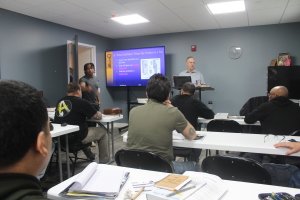Christian Author Challenges Library's Policy Banning Religious Meetings
A Christian author filed a lawsuit against a public library after being denied access to a meeting room for a discussion on her book.
"Christians shouldn't be excluded from reserving and using public meeting facilities because of their beliefs," said Nate Kellum, senior counsel with the Alliance Defense Fund. "It's incredibly ironic that discussing a book would be prohibited in a library. The government cannot discriminate against Christians just because of their religious viewpoint."
The complaint was filed Thursday against Putnam County Library in Cookeville, Tenn.
Ilene Vick, who professes to be an evangelical Christian, wanted to have small group discussions around her book, Personality Based Evangelism.
According to the complaint, Vick "believes all Christians should convey their faith, and the basis for their faith, to others."
"It is Vick's understanding that the Bible commands Christians everywhere to 'evangelize,' that is, to teach other what Jesus taught, and what the Bible teaches, about faith in Jesus Christ," ADF attorneys stated in the complaint.
In early 2009 Vick was told by the director of the library at that time, Diane Duncan, that she could not use the meeting room.
"Our public room cannot be used for religious purposes. I'm sorry, we can't accommodate you," Duncan told the author.
Vick tried again later that year but was still denied access.
The library's acting director, Nicole Pugh, however, confused Vick when she stated, "The only religious purpose the room can be used for is to conduct church business, but not religious instruction."
According to the Putnam Library Room Policy, "meeting rooms are available for public gatherings of a civic, cultural, or educational character. Rooms are not available for meetings of social, political, partisan, or religious purposes; for the benefit of private individuals or commercial concerns; for the presentation of one side of controversial matters; or when, in the judgment of the Library Board, disorder may be likely to occur."
The local author attempted for the third time to reserve the public meeting room early this year, hoping that the library changed its policy, but to no avail.
Attorneys representing Vick argue that the library violated the author's freedom of speech rights and that the room policy discriminates against speech on the basis of the speaker's viewpoint.
They also contend that though the content of the discussion would concern religion, it would be educational, civic, and cultural in character.
"Vick's desired meetings would be no different from the discussion of any other book in a typical book club setting," the complaint reads. "Vick does not understand how discussion of a book concerning a religious view can be singled out and excluded when the meeting room is used to discuss other viewpoints."





























